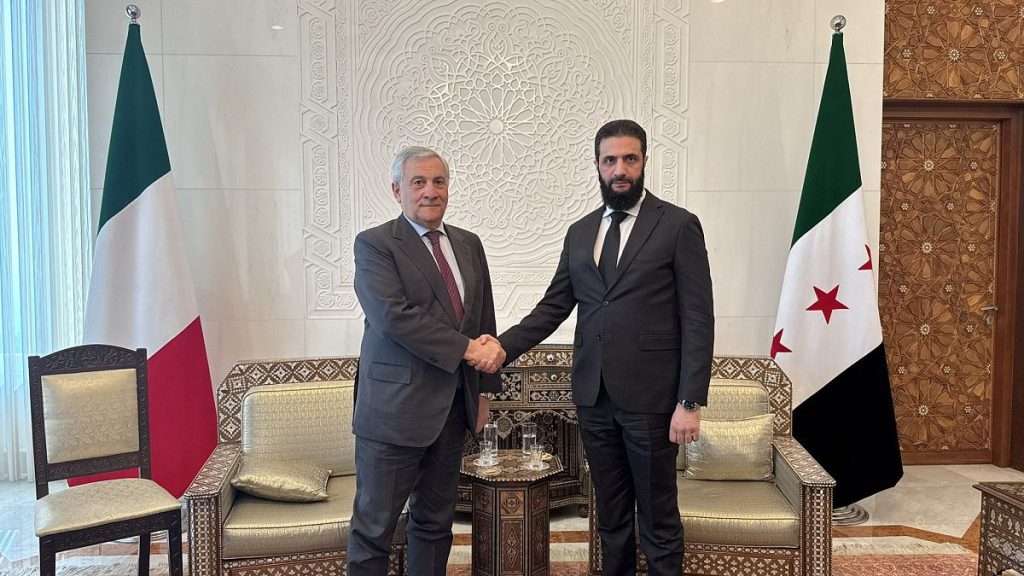A New Chapter in Syrian-European Relations: Italy Takes the Lead in Diplomatic Engagement
Italian Foreign Minister Antonio Tajani’s visit to Damascus marks a significant shift in the European Union’s approach to Syria following the collapse of Bashar al-Assad’s regime. This visit, the first by an Italian foreign minister since the regime change, signals Italy’s willingness to engage with the new Syrian administration led by Ahmed al-Sharia, also known as Abu Mohammed al Jolani. Tajani’s trip follows recent visits by German and French foreign ministers, indicating a broader European interest in re-establishing diplomatic ties and fostering stability in the war-torn nation. Italy’s proactive stance reflects a growing recognition that engagement and dialogue are crucial to addressing the complex challenges facing Syria and its people.
Central to Tajani’s visit was the emphasis on rebuilding bilateral relations and fostering cooperation in various sectors. The Italian foreign minister expressed Italy’s readiness to support Syria’s reform process and facilitate economic cooperation in crucial areas such as energy, infrastructure, and healthcare. Furthermore, he proposed cultural collaborations between universities and joint efforts to combat human trafficking and drug smuggling. This multifaceted approach demonstrates Italy’s commitment to a holistic engagement that addresses both immediate needs and long-term development goals. The reopening of the Italian embassy in Damascus last year further underscores this commitment.
However, the legacy of sanctions imposed on Syria during the al-Assad era casts a long shadow over the country’s recovery and the prospects for enhanced cooperation. Syrian Foreign Minister Asaad al-Shaibani highlighted the detrimental impact of these sanctions, urging their removal to facilitate reconstruction and economic revival. This underscores the complex interplay between past actions and present realities, highlighting the need for a nuanced and pragmatic approach to international relations. The sanctions issue presents a significant hurdle that must be addressed for meaningful progress to be achieved.
Tajani’s visit also holds symbolic significance, encompassing both cultural exchange and regional diplomacy. His visit to the Umayyad Mosque, a historical and architectural landmark reflecting Syria’s rich cultural heritage, underscores the importance of cultural diplomacy in fostering understanding and building bridges between nations. Moreover, Tajani’s subsequent stop in Beirut to meet the newly elected Lebanese president, Joseph Aoun, highlights the interconnectedness of regional stability and the need for coordinated diplomatic efforts.
The broader context of Tajani’s visit reveals a concerted effort within the EU to re-engage with Syria. Prior to his trip, Tajani convened a meeting of foreign ministry officials from key Western powers, including Britain, France, Germany, and the United States, and also spoke with his counterparts from Turkey and Saudi Arabia. This coordinated approach signifies a recognition of the importance of international collaboration in addressing the Syrian crisis. Furthermore, the meeting with EU High Representative for Foreign Affairs and Security Policy, Kaja Kallas, underscored the potential for a gradual easing of sanctions, contingent upon tangible progress in Syria’s reform process.
The evolving situation in Syria presents both opportunities and challenges for the EU. While the collapse of the al-Assad regime offers a chance for a fresh start, the path to peace and stability is fraught with complexities. The EU’s willingness to engage with the new Syrian administration, as exemplified by Tajani’s visit, represents a pragmatic approach that prioritizes dialogue and cooperation. However, the issue of sanctions remains a contentious point, requiring careful consideration and a balanced approach that takes into account both humanitarian concerns and the need to encourage positive change within Syria. The coming months will be crucial in determining the direction of Syrian-European relations and the future trajectory of the war-torn nation.














